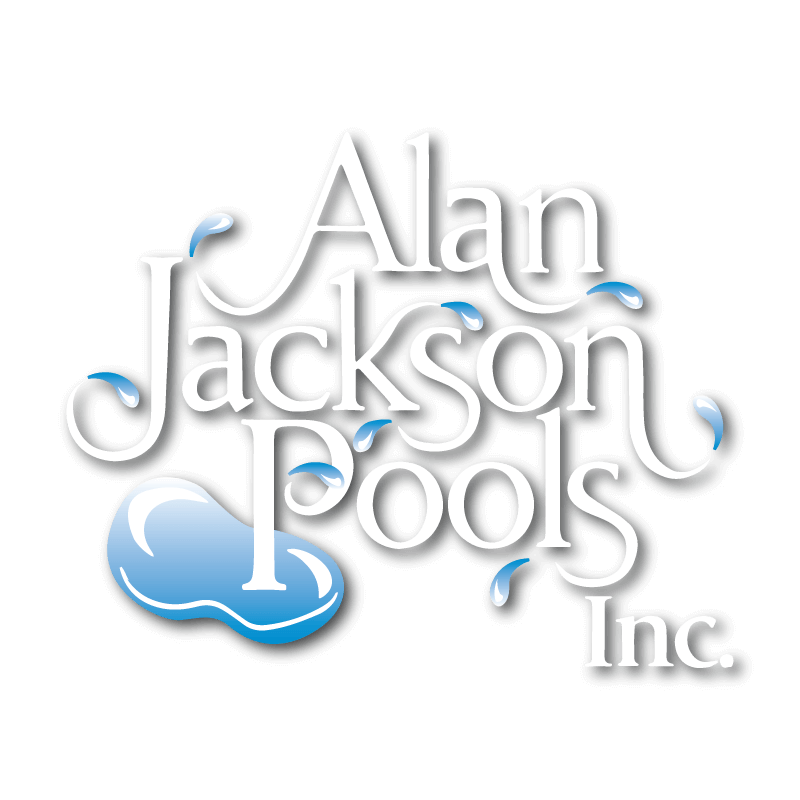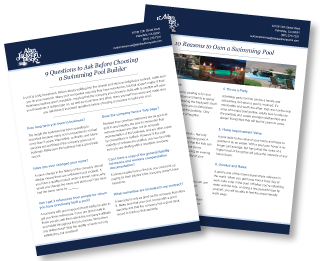Pool maintenance might feel like a headache of endless amateur chemistry. Pool owners can’t help but find themselves playing a continual balancing act with pH balancing, sanitation, and alkalinity.
From a scientific perspective, there’s a whole lot more going on in your swimming pool than Marco Polo. It’s a vortex of human bodies and chemicals, not just a tub of H2O. Here we’ll cover some common chemicals you can use in your pool, but it’s always best to contact the professionals at Alan Jackson Pools first.
Quick Pool Chemical Reference Guide
Alkalinity Increase & Decrease
- Sodium Hydrogen Carbonate, NaHCO3: aka Sodium Bicarbonate, Baking Soda. Raises the Alkalinity of pool water with very little effect on pH. Per know-your-pool.com it’s available in powder form with names like Alkalinity Up, Alkaline Rise and Alkalinity Increaser.
- Muriatic Acid, HCI: aka Sodium Bisulfate, Spirits of Salt, Acidium Salts. Somewhat dangerous but economical, muriatic acid lowers pH while also lowering total alkalinity. Use with caution. The liquid form is muriatic acid, the powder form sodium bisulfate.
pH Increase & Decrease
- Sodium Carbonate, Na2CO3: aka Soda Ash. Increases the pH of the pool. Available in both liquid and powder form. Per know-your-pool.com common market names are pH Up, pH Rise and pH Increaser.
- Sodium Bisulfate, NaHSO4: aka sodium hydrogen sulfate. Lowers swimming pool pH rapidly lowers alkalinity slightly. Common retail names: pH Down and pH Decreaser. Available in both liquid and powder form.
Sanitizers
One of the most frequent questions asked of pool service professionals is the proper use of sanitizers.
- Chlorine, Cl2: The most common swimming pool sanitizer. Per the US Library of Medicine “At room temperature, chlorine is a yellow-green gas that is heavier than air and has a strong irritating odor. It can be converted to a liquid under pressure or cold temperatures.” It’s available in a variety of forms: liquids, granules, and tablets of varying size and composition. Tablets are arguably the easiest way to provide a constant supply of chlorine.
- Outdoor pools benefit from stabilized chlorine. Cyanuric Acid, aka Stabilizer, will prevent chlorine from breaking down in sunlight.
- Bromine, Br2: Available in tablet and granular form. Bromine is generally thought to be gentler on human swimmers than chlorine. Like chlorine, it is sensitive to UV light and will dissipate rapidly if the pool is in a sunny yard. This chemical needs nearly constant replenishment to be effective. It is more expensive than chlorine but is a better algaecide.
If you’re thinking about chemical-free methods of sanitization, consider Ionization. It’s considered a more natural method, using copper and silver to kill bacteria and algae. This method isn’t entirely chemical-free however, you will still need to shock the pool weekly with chlorine.
Would you like to learn more about the advanced chemistry going on in your pool? Contact us today, we’d love to help!


